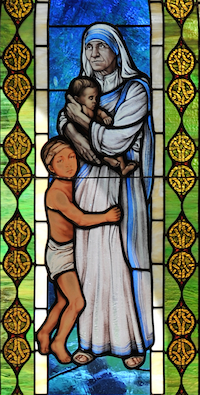Welcome the Stranger: Blessed Teresa of Calcutta

Mother Teresea began each day of her work in the slums of Calcutta by receiving Communion. Then she took that divine love out to the streets to share with the stranger—those who were, in her words, “the unwanted, the unloved, the uncared for.”
She was born in Albania in 1910. Her father died when she was 8, casting the family into poverty. She found solace in her faith, and was very active in her Jesuit parish as a young girl.
When she turned 18, she followed a call to enter religious life and joined a community of sisters in Ireland, taking the name Sister Mary Teresa, after St. Therese of Lisieux. A year later, she was on her way to India as a missionary, where her work with the outcast would inspire the world.
She experienced a profound encounter with Christ in 1946 while she was on her way to her annual retreat. She was riding on a train when she received some source of inspiration, a “call within a call,” as she put it. She was consumed with Jesus’ love for every person, and the desire to offer that love to others became a motivating force in her life from that moment on.
She understood Jesus to be calling her and others to offer his love to the poor and neglected, so she began entering the slums of Calcutta to visit suffering families. She washed the wounds of children, cared for those who were abandoned and sick, and nursed those who were dying.
Other women joined her in this work, so she began a new religious order, the Missionaries of Charity, and soon was able to send some to other parts of India. Today, some 4,500 members participate in her work in more than 130 countries.
Mother Teresa died on this date in 1997, and is buried in the mother house of the Missionaries of Charity—her tomb is a place of pilgrimage and prayer today. In December, a second miracle was recognized by the Vatican, which clears the path towards sainthood for her. A canonization date is pending.
Read more about Mother Teresa’s life, including her visit to Notre Dame in 1974, on this page.
Take and Eat
By Luke Brennan ‘18
This summer I spent time volunteering at a school for kids with mental disabilities.
In the weeks leading up to the first day, I read a couple of articles on how best to live with those who have a mental disability. Everything I found seemed to orbit around the concept of vulnerability. “Children with special needs can touch your heart,” they said, “but you have to let them in. Be weak. Remove your boundaries and your protections. Be vulnerable.”
Okay, great. Got it. I can do this. I just have to be vulnerable.
I was nervous on my first day. It made my hands tingly. My mind buzzed, and my words chattered over my tongue. I remember finding comfort in what I read. I can do this. Vulnerable. I just have to be vulnerable. I can do this.
When I walked into the classroom, I sat next to a student named Rich and immediately realized that I had no practical idea what it meant to be vulnerable. My mind zapped off, and then back on again, flooding with ideas, brainstorming ways to be more approachable. How should I introduce myself? A handshake? A high-five? What introduction would make me most vulnerable?
The duration of the morning was more or less a theatrical production of awkwardness, featuring me in the struggle to figure out the right words and body language to present myself as a vulnerable human being. I did not succeed.
Then it was snack time. Here came the cheeseballs.
I helped distribute napkins and gently poured out a handful of cheeseballs for each student. Afterwards, I found my seat again by Rich who was starting to eat his snack. He stopped and looked at me. I didn’t have any cheeseballs. He looked back at his own pile, picked out a cheeseball, and offered it to me.
Take and eat.
I’m not sure why, but something about that moment made me let go of all the things that I thought I had to do. It was as if Rich was saying: “Look, I don’t know what you’re doing or what you’re trying to do. But here, take this cheeseball, and eat with me. Be with me.”
I’ve always defined myself with what I’ve done, what I’ve accomplished, what I’ve been able to do—but in that moment, none of it mattered anymore. All the good grades, the accepted applications, the awards and certificates of achievement were torn away, and I was left with the humble truth that I simply was a human being, loved by God, and now, loved by Rich. I was a stranger and I felt unworthy—I felt awkward and uncomfortable—but Rich welcomed me into a kind of communion.
Throughout the summer, Rich continued to reach out to me. Slowly, he convinced me that I was valuable, not for anything that I’d done, but for being myself. With all of my disabilities and none of my achievements—I was me, and he loved me for it.

